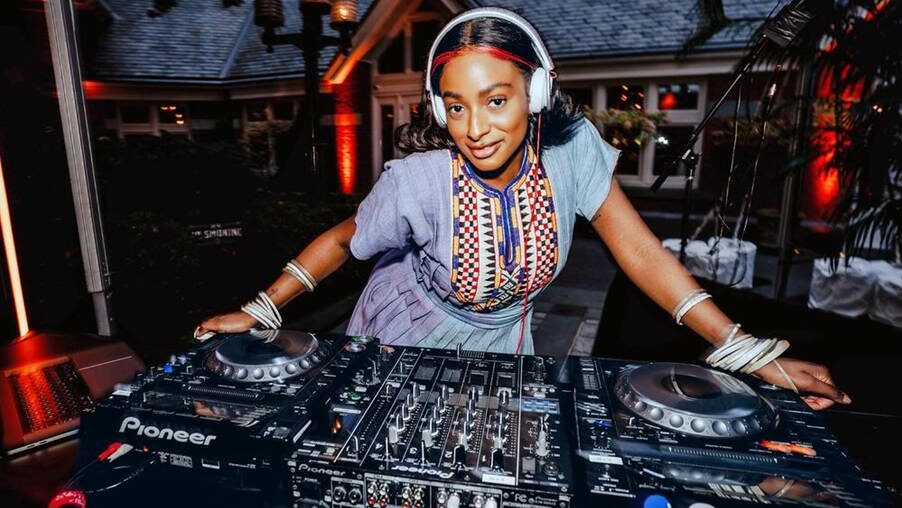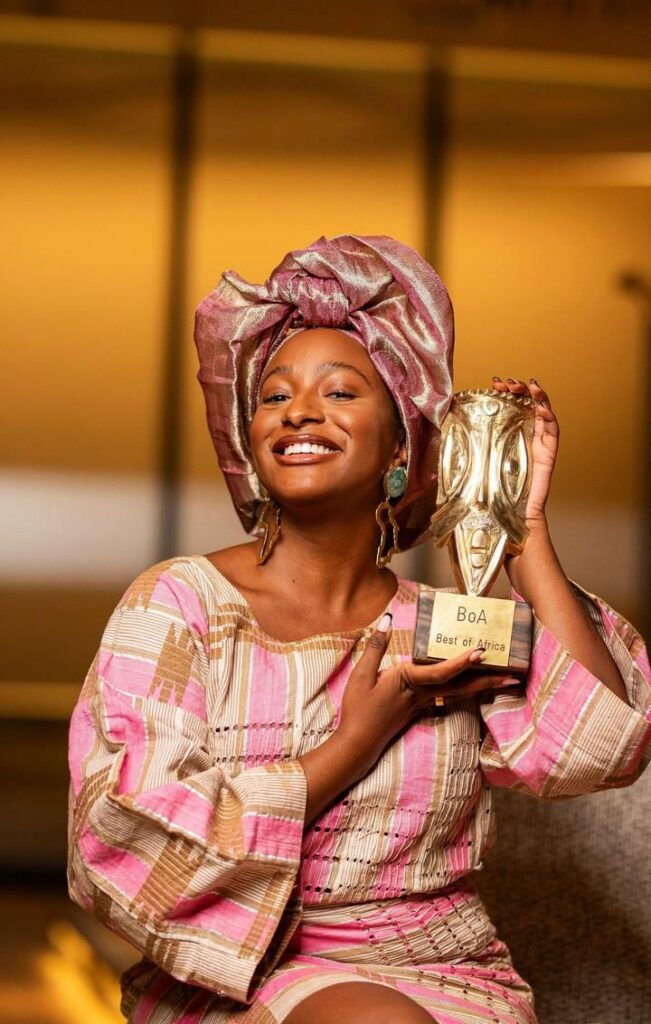
Reinventing the Narrative
For Florence Ifeoluwa Otedola, known universally as Cuppy, reinvention has always been the rhythm behind the music.
She began with pink wigs, cupcakes, and a playful brand that made her instantly recognizable. Today, she commands festival stages across continents, speaks at global forums, and invests in education.
“It’s a great opportunity to change the narrative and showcase the beauty that is resident in the continent,” she told King’s College London. “Because if we do not tell it ourselves, who will?”
Her evolution from “pink princess” to philanthropic figure reflects a thoughtful shift in how she uses her platform and influence. Through education, authenticity, and strategy, she’s shown how creative identity can mature without losing its color.
Pink Paradise Years
Cuppy’s entry into the Nigerian music scene was as vibrant as her signature hue. At a time when female DJs were rarely seen, she established a presence that stood out. Pink wigs, candy-colored turntables, and a “Cuppy Cakes” brand turned her into a phenomenon.
In 2014, she released her first mixtape, House of Cuppy, blending house and Afrobeats in a genre-crossing experiment that defined her early sound. It was bold, feminine, and unapologetically commercial proof that she could master not just the decks but the art of self-presentation.
Five years later, “Gelato” (2019), her viral collaboration with Zlatan, solidified her pop credentials and made her a household name. Beneath the playfulness, though, was a quietly radical strategy.
By leaning into a hyper-feminine aesthetic, she defied the stereotype that Nigerian DJs had to mimic their male peers to be taken seriously. The “pink paradise” wasn’t superficial, it was subversive. In claiming visual space, she claimed cultural space.
That early era built her visibility. It made “Cuppy” not just a name but a brand one she would later reinvent on her own terms.
The Deliberate Rebrand

As Cuppy’s popularity grew, so did her ambitions. She began seeking depth beyond the decks.
Her pivot was not spontaneous; it was meticulously planned. She re-engineered her image through education, philanthropy, and refined artistry.
She earned a degree in Business and Economics from King’s College London, a Master’s in Music Business from New York University, and an MSc in African Studies from Oxford University.
Each degree added a layer to her reinvention business discipline, industry literacy, and cultural consciousness.
Her rebrand extended to her voice. Gone were the candy-colored interviews; in their place came thoughtful reflections on identity, youth empowerment, and Africa’s creative economy. She began to see herself as a bridge between art and advocacy.
“‘Today it’s less cupcakes, more clarity,’ she says of the confectionery that inspired her stage name. ‘I still love pink, but I want the work I’m doing in philanthropy and education to speak louder than my colour. And when DJ Cuppy speaks, people take notice.”
Her “Cuppy 2.0” phase stripped away the gimmicks without losing the charm. She evolved from pop persona to purposeful public figure, using global education as both a mirror and a megaphone.
Defining Global Stages
Today, Cuppy’s performances transcend geography. She has graced some of the world’s biggest stages from Wireless Festival in London, to large stadium crowds and exclusive private events attended by high-profile guests.
Her international presence underscores a broader truth: Nigerian talent no longer needs translation to be global. By mixing Lagos beats with London polish, she embodies the fluid identity of a new generation of African creatives.
Each show becomes an act of representation. Every performance says: Africa doesn’t just contribute to global culture, it defines it.
Cuppy and Cultural Power
Beyond music, Cuppy’s impact lies in cultural re-engineering. She played a role in presenting Afrobeats not as a niche genre, but as a globally appealing cultural movement. She does so while amplifying women’s visibility in an industry still catching up.
As BBC Africa observed:
“Cuppy’s music and philanthropy make her more than an entertainer, she is a symbol of a new generation of African women leading globally.”
Her global tours and collaborations from Tekno to Stonebwoy carry Lagos energy to European and American audiences. Yet, she remains grounded in authenticity. “Afrobeats is more than sound,” she said at Oxford in 2023. “It’s identity.”
Through this dual lens artist and advocate, she’s become both symbol and signal: proof that African women can lead on any stage without compromising their roots.
Beyond the Decks – Philanthropy in Action

(Picture: David Tett)
Cuppy’s evolution finds its fullest expression in philanthropy. In 2018, she founded the Cuppy Foundation to advance child welfare and education in Nigeria. Partnering with Save the Children UK, the organization has raised millions to support displaced children and families.
Her giving extends to education the same ladder she climbed. She’s pledged more than £250,000 in hardship and scholarship funds across her alma maters:
- Oxford University – £100,000 over 10 years for African graduate students.
- New York University – $100,000 over five years for African students in the arts.
- King’s College London – £50,000 over five years to support African students facing financial barriers.
Each donation connects back to her belief that access to education is the most powerful form of empowerment. “My access to education made me realise it’s such an important tool,” she said. “It gives you power and it gives you options.”
Her philanthropy is strategic, sustainable, and deeply personal. In public appearances ranging from international forums to major philanthropic events, she emphasizes impact over image. For her, fame is only useful if it fuels change.
Education as Empowerment
Unlike many entertainers who treat academia as a postscript, Cuppy treats it as part of her artistic DNA. Education didn’t pause her career, it expanded it.
At King’s College London, she blended business theory with beats, learning to navigate contracts and branding. At NYU, she dissected the global music economy. At Oxford, she explored Africa’s evolving narrative in world culture. Each experience sharpened her sense of responsibility.
In 2025, King’s College celebrated her return as a major donor, calling her “a shining example of alumni impact.” (KCL News). That full-circle moment reflected more than gratitude it symbolized how far creativity and conviction can travel together.
Through these commitments, she reframed what it means to be a celebrity from Africa. Her platform isn’t a pedestal, it’s a classroom.
Cuppy 2.0 and the Era of Intentional Influence

Cuppy’s journey mirrors a wider cultural shift among African creatives who see success not as arrival but as influence.
“Cuppy 2.0” is not merely a phase; it’s a philosophy proof that reinvention can be purposeful, strategic, and generational.
She uses her visibility to humanize African excellence, reminding global audiences that talent from the continent is multidimensional, creative, intellectual, and compassionate.
Her formula for lasting relevance is elegantly simple:
- Education gives her credibility.
- Authenticity keeps her grounded.
Empathy drives her legacy.
From Lagos to London, she’s built a brand that thrives on connection rather than spectacle—a brand that tells young Africans they can be glamorous and grounded.
Lessons from Cuppy 2.0
Cuppy’s reinvention offers a playbook for modern creators:
- Be seen. Her pink era taught that visibility precedes validation.
- Be serious. Education and philanthropy earned her gravitas beyond the decks.
- Be rooted. Global acclaim is most powerful when it uplifts local communities.
Be intentional. Every phase of her career was a conscious chapter, not a coincidence.
She turned fame into function using the spotlight to illuminate social issues rather than herself.

A Legacy in Progress
Cuppy’s story is about more than beats and brands; it’s about how an artist becomes an institution.
She embodies new ideas of success for Africa’s creative generation that blends art, intellect, and activism.
Her dual identity DJ and donor, performer and philosopher-has reframed global perceptions of African women in entertainment. Where earlier narratives sought validation from abroad, Cuppy builds bridges instead.
Her life now moves between Buckingham Palace and Lagos youth centres, between Oxford lecterns and festival stages. Everywhere she goes, the mission remains constant: to connect, to educate, to inspire.
Florence Ifeoluwa Otedola may have traded cupcakes for causes, but the essence remains the same joy, color, and rhythm as tools for change.
“I’m just getting started,” she often tells interviewers. “There’s a lot more music to play and a lot more lives to change.”
